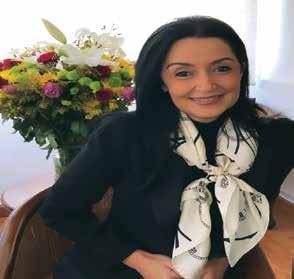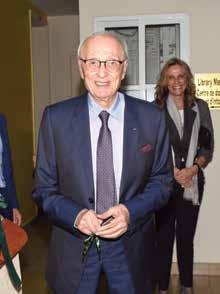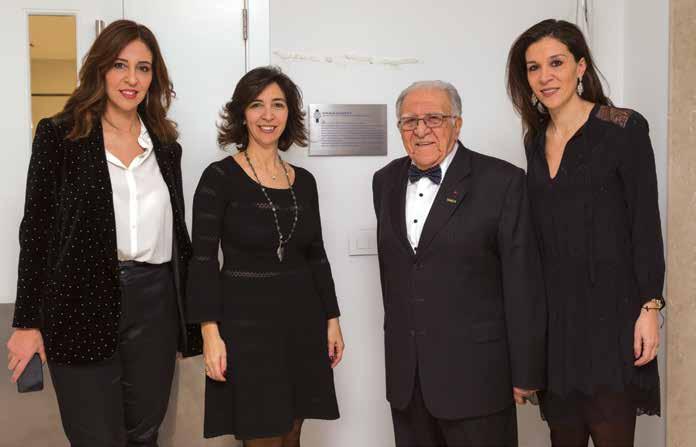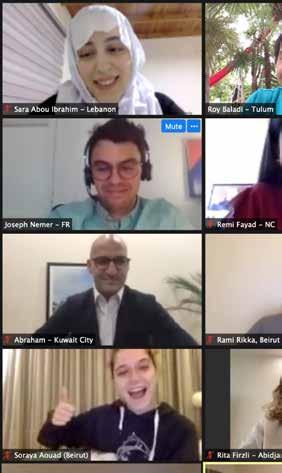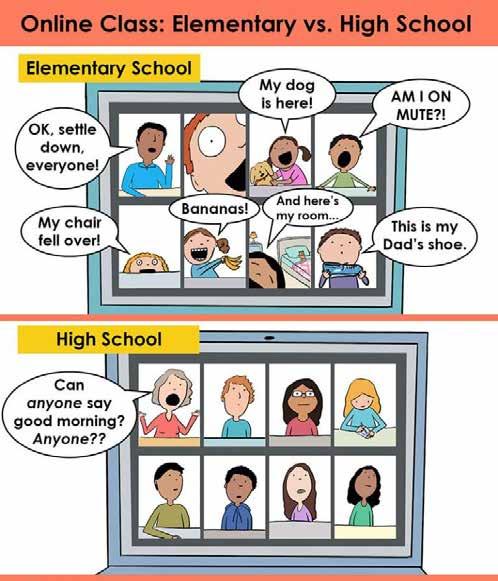
4 minute read
IRADA, the will to rise again
IRADA Economic Dinner in 2018. IRADA Board Members: Abussamii Al Sharif, Abdallah Shahine, Jamil Mekawi, Malek Chaar ‘95, Reem Beydoun ‘01, Assem Nawam, Muhieddine Doughan, Omar Debs ‘85, Mazen Shbaro, Bassem Bawab ‘93, Amir Kataranji, Hassan Attar
IRADA, The name fits too well. Irada, the will. The will to survive. The will to rise again. It a blind eye, leave, or help the country survive. the will seemed only natural for IRADA to assist in the fundraising efforts to rebuild the Option number one would go against every grain of IRADA’s motto: Happiness to rise broken city. When Assem Nawam ’87, managing director at Powertech, cofounded the comes from giving and not taking. Option number two was unfathomable: Quitting. “I am not leaving this country again NGO seven years ago, the ‘will’ to rise again did not even cross his mind. Why even if I am the last man in Lebanon,” said Nawam. would it? It was well before an economic crisis gripped the country, a pandemic engulfed the world, and a catastrophic Beirut blast destroyed a large part of the city, killing almost 200 people, injuring thousands, and displacing hundreds. Back then, the idea was to get a group of experienced business people together, form an NGO, and allow them to benefit from each other’s experiences while simultaneously supporting society. They called it IRADA. In English, it translates to the Federation of Businessmen for Support and Development. But it sounds much better in Arabic: the will. This will was first tested earlier this year with the onset of the economic crisis. As the Lebanese pound tumbled and prices and inflation soared, many businesses across the country began shutting down. IRADA rallied. Its members – all 239 of them - were determined to face the economic challenge. They got together. Some capitals merged. IRADA businesses continued. At this point, the choice was clear: turn Ricardo Hosri, Assem Nawam ’87,
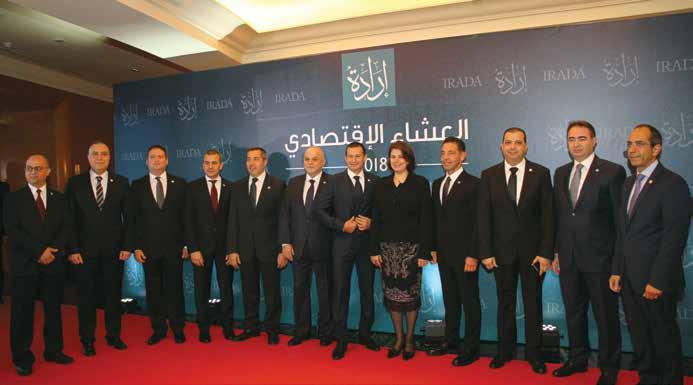
That left option number 3: help the country survive. If there’s a will, there is a way. And there was a will.
IRADA turned to its self-funded reserves. So far, their ‘coffer’ has been able to launch and fund many programs since its inception. Fortunately, since the epidemic hit last March, members increased their donations allowing IRADA to boost its social programs.
The first was ‘Khoubourat,’ a human resource program aimed at matching job seekers with employers and assisting candidates in their curriculum vitae writing, career guidance, and skills enhancement – all free of charge. An agreement with Bayt.com (a leading job site in the Middle East and North Africa) gives candidates the needed exposure. The idea was to match the right person with the right job, but “if we find that the candidates miss a specific skill which would prevent them from landing the job, we train them in that specific skill,” said Nawam.
In one month alone, the Khoubourat program made 22 placements within the IRADA and non-IRADA network – despite the economic crises.
Shortly after, IRADA launched another program: Tafawak. This was explicitly aimed towards granting students’ interestfree university loans starting in the second year. “These students are the country’s future,” said Nawam. “No one should leave university because of the inability to pay fees. That’s when we interfere.”
Perhaps the most crucial of all at present is the ITHRAA program, where small to medium businesses are granted interest-free loans to assist them in starting-up or expanding their businesses. With the dire economic crises only worsening, IRADA sees an avalanche of applications from firms about to shut down. Since it is impossible to finance every venture, IRADA often turns to non-financial ways, such as mergers, strategic planning, financial advice, or providing the right networking connections. “We help them find a way to keep going,” said Nawam.
As long as there’s a will.
But IRADA can’t stop there. The need is just too great.
When Corona first reared its ugly head in March, members donated around 300m LL towards hospitals to help them battle the disease – and provided its own IRADA physician members to assist in consultations.
Then, in April, Dar El Fatwa and IRADA, with 17 other NGOs, launched a telethon, the Ramadan Unified Donation Campaign, to collect Zakat (obligatory tax required of Muslims) and other donations for underprivileged families. In eight hours, they managed to collect 8 billion LL.
But their biggest test of a ‘will’ came on August 22, when IRADA, along with RDCL (Rassemblement de Dirigeants et Chefs d’entreprise Libanais), launched “Kulluna LiBeirut” – a televised fundraising campaign to help rebuild schools and homes in the blast area. By the end of the day, they had raised 8.5 billion LL – distributed to various NGOs.
“It’s what we stand for,” explained Nawam, “A will to help and be there for our communities. It’s our duty.”
But IRADA’s duties are far from over. Members are now debating a new project: a self-sustainable agricultural initiative to keep farmers on their land proudly plowing their ancestral soils.
“When successful business people collaborate, they can have a strong impact on their societies and be of great service to their communities,” said Nawam. “This is what IRADA is all about.”

Assem Nawam




